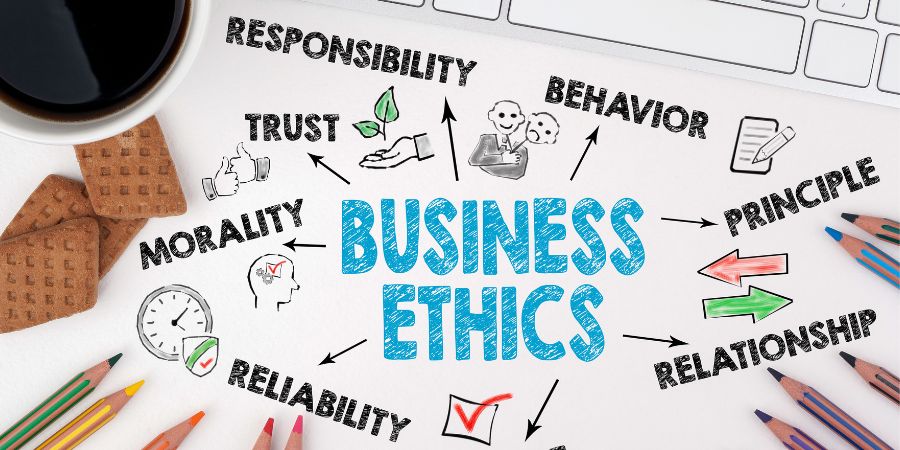Business ethics is the set of standards that business professionals use to determine right vs. wrong in their profession. These standards are based on morals and values, not just laws or rules. Business ethics helps businesses see where they stand compared to a neutral standard of right vs. wrong in their profession, so they can make adjustments if they need to.
After all, no one wants to be known as an unethical business professional. Implementing business ethics will have a positive impact on your company’s reputation and help you maintain your principles as you continue to grow your business and expand your services. Understanding the importance of business ethics lets you identify areas where you can improve and offers you guidance on how best to proceed from this point onward.
What Is the Difference Between Morals and Ethics?
Morals refer to a person’s values and beliefs. These are personal and subjective, and different people will have different morals. Ethics, on the other hand, are the rules or standards that guide appropriate and incorrect behaviour in general. These can be applied to people from all walks of life, regardless of profession. Business ethics are the rules that business professionals use to determine right and wrong in their profession.

Why Is Business Ethics Important?
This is something that many business owners often overlook, especially if they are new to the industry. It can be tempting to think, “My competitors are not doing this, so it must be okay.” Unfortunately, that is not always the case. In fact, it is more likely than not that you are putting your company at a disadvantage by not adhering to business ethics. People tend to favour businesses they can trust. And while trust is not always earned, it is often given. If a customer feels like you are doing the right thing, they are more likely to remain loyal to your business, regardless of price.
The Importance of Having a Code of Business Conduct
No matter what kind of business you operate, having a Code of Business Conduct will help you stay ethical. This document outlines the standards you expect from your employees and guides on how to resolve business disputes, manage conflict, and make ethical business decisions.
It is best to write this code down, rather than leave it in your head. That way, you can easily refer to it if you find yourself in a tough situation and need a reminder of your company’s standards. You should also make your code available to customers and other stakeholders, so they can see for themselves that you are adhering to a set of standards.

The Importance of Being Transparent
Transparency means you are letting your customers see behind the curtain and get a glimpse of how your business operates. This does not mean you need to share all your sensitive information with the world. But it does mean you need to provide honest and clear answers to customer questions and provide contractual terms that reflect your business practices.
You should also take the time to review your prices and make sure they reflect fair market value, without being too high. You may want to get feedback from your customers or peers to make sure you’re not over-pricing your services.
The Importance of Being Responsible
Being responsible means taking ownership of your actions and adhering to the Code of Business Conduct you have set for your business. If something goes wrong, you need to have a plan to make it right. This could mean offering a refund, fixing a faulty product, or providing a solution to a customer complaint.
If you have employees, you also need to make sure they’re following your business’s standards. This means not just punishing employees when they make a mistake, but making sure they understand why their actions were wrong and how to do things the right way next time.
Conclusion
It is important to remember that business ethics is not a concept that exists only in theory, it is a very real and proven strategy that can be used to improve the performance of businesses.
